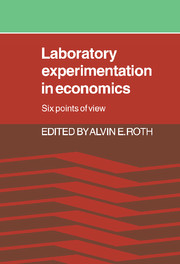Book contents
- Frontmatter
- Contents
- Acknowledgments
- List of contributors
- 1 Introduction and overview
- 2 Bargaining phenomena and bargaining theory
- 3 Equity and coalition bargaining in experimental three-person games
- 4 The psychology of choice and the assumptions of economics
- 5 Hypothetical valuations and preference reversals in the context of asset trading
- 6 Economics according to the rats (and pigeons too): what have we learned and what can we hope to learn?
- 7 Dimensions of parallelism: some policy applications of experimental methods
4 - The psychology of choice and the assumptions of economics
Published online by Cambridge University Press: 24 October 2009
- Frontmatter
- Contents
- Acknowledgments
- List of contributors
- 1 Introduction and overview
- 2 Bargaining phenomena and bargaining theory
- 3 Equity and coalition bargaining in experimental three-person games
- 4 The psychology of choice and the assumptions of economics
- 5 Hypothetical valuations and preference reversals in the context of asset trading
- 6 Economics according to the rats (and pigeons too): what have we learned and what can we hope to learn?
- 7 Dimensions of parallelism: some policy applications of experimental methods
Summary
Introduction
Neoclassical economics is based on the premise that models that characterize rational, optimizing behavior also characterize actual human behavior. The same model is used as a normative definition of rational choice and a descriptive predictor of observed choice. Many of the advances in economic theory in the past 50 years have constituted clarifications of the normative model. One of the most significant of these advances was the normative theory of choice under uncertainty, expected utility theory, formulated by John von Neumann and Oskar Morgenstern (1947). Expected utility theory defined rational choice in the context of uncertainty. Because of the dual role economic theories are expected to play, expected utility theory also provided the basis for a new style of research pioneered by Maurice Allais (1953) and Daniel Ellsberg (1961). Allais and Ellsberg exploited the precision of the theory to construct crisp counterexamples of its descriptive predictions. The methods they used to demonstrate the force of their counterexamples were similar. Some prominent economists and statisticians were presented with problems to which most gave answers inconsistent with the theory. The fact that Savage was induced to violate one of his own axioms was taken to be sufficient proof that a genuine effect had been discovered.
- Type
- Chapter
- Information
- Laboratory Experimentation in EconomicsSix Points of View, pp. 99 - 130Publisher: Cambridge University PressPrint publication year: 1987
- 57
- Cited by



